Fintech as an industry has seen immense growth over the past two decades. People from all walks of life, in one way or another, are using fintech services today.
The services are widely adopted by the users, making fintech a global phenomenon.
However, this acceptance and adaptation also brings along several challenges and risks. Especially when matters are associated with finances and money.
People using online services to manage their finances are directly prone to several security issues. That is because with a third-party platform being involved in the transactions, all your personal and banking data is up for exploitation.
However, that usually can’t happen thanks to fintech regulations and compliance that are put in place by respective bodies from around the globe, in different regions. These fintech regulations and compliances allow individuals to stay safe from all the possible scams.
In this post, let us take a look at fintech regulations and compliance and understand the different factors related to the same.
We will also be looking at the major risks in fintech that can be minimized using these compliances. And exactly which organizations are responsible for implementing these regulations in the wider field of fintech?
Without further ado, let’s get started!
What is Meant by Fintech Regulations & Compliance?
Fintech regulations and compliance refer to the norms that allow fintech businesses to mitigate the risks and make the entire experience more secure than ever.
There are different entities involved in a fintech transaction. There are fintech app users, service providers, and then there are facilitators
All of these have their respective limitations and standard risks that they have to manage. Fintechs should effectively manage arrears and take actions to mitigate risks.
Fintech regulations and compliance serve as the key adhesive that keeps user trust and service integrity intact for any financial institution.
“Regulations and compliance are essential for fintech companies to ensure secure and trustworthy operations, helping them remain competitive in the market.”
Why are Fintech Regulations Important?
Fintech regulations and compliance ensure that the integrity of each operation that involves your fintech solution, staff, and customers remains intact. Different considerations are taken into account when implementing these regulations.
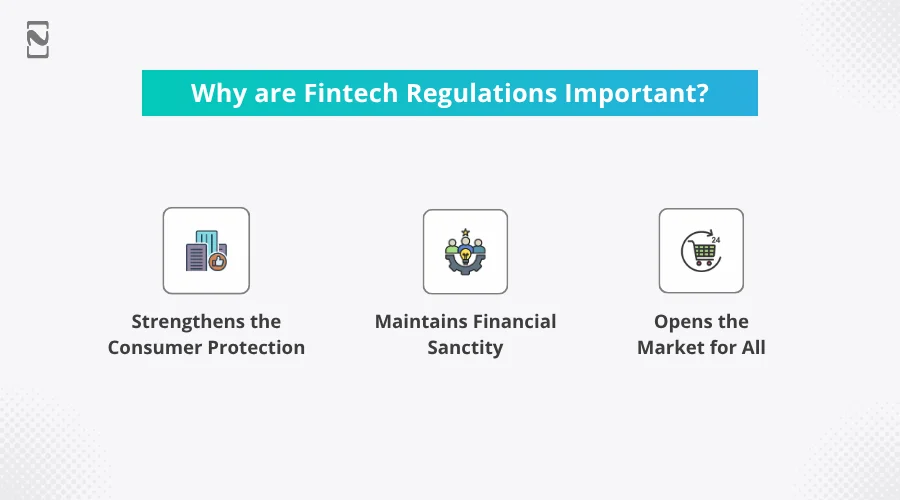
Here are some reasons why fintech regulations play a significant role:
1. Strengthens Consumer Protection
Fintech compliance regulations are super important for fintech app security.
You see, fintech compliance deals with fraud and abuse. Without regulations, bad actors could easily exploit digital tools for scams, money laundering, and other illegal activities.
Regulations help create safeguards, requiring KYC/AML measures and data security practices to protect consumers. Regulations also promote transparency and fairness. Complex financial products and services can be confusing for users.
Regulations ensure clear disclosure of terms, risks, and fees, empowering consumers to make informed decisions and avoid unfair practices.
2. Maintains Financial Sanctity
For financial businesses that are not regulated, it is very easy to exploit customers. That defies the whole purpose of offering financial services in the first place, as people look to fintech services when they are struggling.
Unregulated growth in certain areas of fintech could create bubbles with the potential to destabilize the broader financial system. Regulations set prudential standards for capital adequacy, risk management, and liquidity to prevent such crises.
In addition, global fintech regulations act as a barrier to such activities, ensuring the smooth flow of legitimate funds and fostering trust in the system.
3. Opening the Market for All
The financial services and fintech market is all about the funds you have and the type of interest rates you offer.
Unregulated factors can allow industry giants to dominate the market and create monopolies.
Which is why it is important to have regulations that stop the market from behaving in a certain way.
Small fintech companies can embrace new technologies to innovate how people use services.
Regulation and compliance create a fair playing field for all, allowing all types of financial institutions to offer services and grow.
Regulations are essential for addressing data privacy, security, and fair treatment, fostering trust, and encouraging the adoption of innovative fintech solutions.
Who Regulates Fintech Companies Around the World?
Looking at the crucial role that fintech compliance and regulations play, you may be wondering what regulatory bodies help in implementing them.
There are several authorities responsible for regulating tech companies. Some have global regulatory authority over these fintech companies, while others have authority in their jurisdiction.
Please see the detailed breakdown of the same below:
| Region | Country | Regulatory Body/Authority | Scope of Regulation |
| ► Global | International Organization for Standardization (ISO) | Data privacy | |
| International Telecommunication Union (ITU) | Data privacy | ||
| Financial Action Task Force (FATF) | Anti-Money Laundering (AML) | ||
| ► North America | United States | Securities & Exchange Commission (SEC) | Investments, crowdfunding, digital assets |
| Commodity Futures Trading Commission (CFTC) | Derivatives and futures | ||
| Consumer Financial Protection Bureau (CFPB) | Consumer protection | ||
| Office of the Comptroller of the Currency (OCC) | National banks and federal savings associations | ||
| State-level regulators | Specific activities, such as money transmission | ||
| Canada | Canadian Securities Administrators (CSA) | Investments and Securities | |
| Financial Consumer Agency of Canada (FCAC) | Consumer protection | ||
| Office of the Superintendent of Financial Institutions (OSFI) | Banks and financial institutions | ||
| ► South America | Brazil | Central Bank of Brazil (BCB) | Financial institutions and payment systems |
| Brazilian Securities and Exchange Commission (CVM) | Investments and Securities | ||
| Colombia | Superintendencia Financiera de Colombia (SFC) | Financial institutions | |
| Banco de la República (Central Bank) | Monetary policy and payment systems | ||
| ► Europe | European Union | European Banking Authority (EBA) | Banking and payments |
| European Securities and Markets Authority (ESMA) | Investments and Securities | ||
| National regulators within each member state | Various financial activities | ||
| Non-EU countries | Similar independent or centralized regulatory structures | Varies by country, e.g., FCA in the UK | |
| ► Asia | China | People’s Bank of China (PBOC) | Financial institutions and payment systems |
| China Securities Regulatory Commission (CSRC) | Investments and Securities | ||
| India | Reserve Bank of India (RBI) | Banks and payment systems | |
| Securities and Exchange Board of India (SEBI) | Investments and Securities | ||
| Japan | Financial Services Agency (FSA) | Financial institutions and activities | |
| Various structures by country | Varies, often central banks and finance ministries | ||
| ► Africa | South Africa | South African Reserve Bank (SARB) | Monetary policy and financial stability |
| Financial Sector Conduct Authority (FSCA) | Financial institutions and activities | ||
| Kenya | Central Bank of Kenya (CBK) | Monetary policy and financial stability | |
| Capital Markets Authority (CMA) | Investments and Securities | ||
| Nigeria | Central Bank of Nigeria (CBN) | Monetary policy and financial stability | |
| Securities and Exchange Commission (SEC) | Investments and Securities | ||
| Other countries | Similar structures emerging | Varies, often central banks and finance ministries | |
| ► Middle East | United Arab Emirates | Central Bank of the United Arab Emirates (CBUAE) | Monetary policy and financial stability |
| Securities and Commodities Authority (SCA) | Investments and Securities | ||
| Financial Services Regulatory Authority (FSRA) | Specific financial activities | ||
| Saudi Arabia | Saudi Arabian Monetary Authority (SAMA) | Monetary policy and financial stability | |
| Capital Markets Authority (CMA) | Investments and Securities |
Fintech Regulations & Compliance in the USA & Europe: An Overview
Regulatory bodies for fintech companies differ by region, resulting in varied compliance requirements.
This section highlights key regulations in the US and EU essential for fintech services.
A] USA – Fintech Regulations in the USA
Let’s start with Fintech regulation in the United States of America.
Similar to the EU, navigating fintech regulations in the US involves understanding a complex patchwork of laws across different levels and agencies.
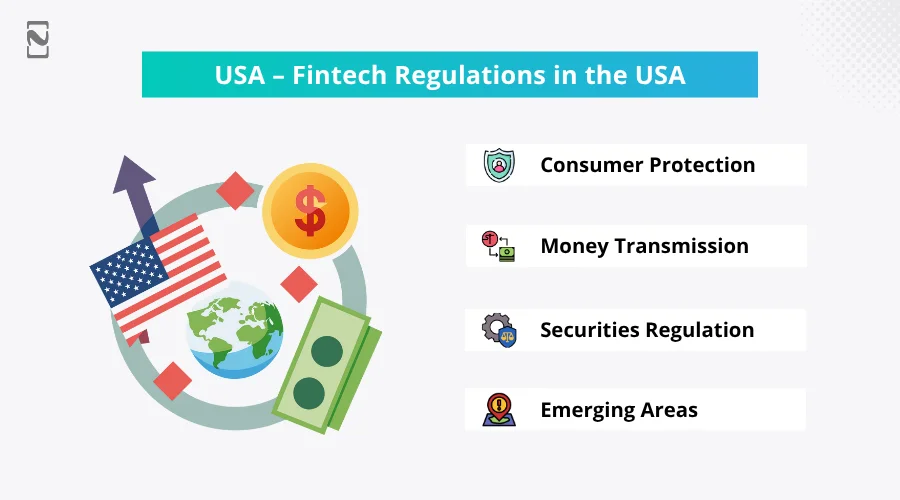
Here’s a closer look at specific regulations in key areas:
Consumer Protection
- Gramm-Leach-bliley Act (GLBA): Safeguards financial privacy and requires data security measures for customer information.
- Fair Credit Reporting Act (FCRA): Governs the collection, dissemination, and use of consumer credit information, impacting credit scoring, reporting, and lending practices.
- Fair Debt Collection Practices Act (FDCPA): Regulates debt collection activities, limiting harassment and unfair practices.
Money Transmission
- Money Transmitter Licenses: Most states require a license to transfer money, with varying requirements depending on the specific activity and volume.
- Bank Secrecy Act (BSA) / Anti-Money Laundering (AML): Mandates Know Your Customer (KYC) procedures, transaction monitoring, and suspicious activity reporting to combat money laundering and terrorist financing.
Securities Regulation
- Securities Act of 1933: requires registration and disclosure for offerings of securities, which applies to fintechs selling investment products or crowdfunding platforms.
- Securities Exchange Act of 1934: regulates trading activities and broker-dealers, impacting fintechs offering investment advice or trading platforms.
Emerging Areas
- Consumer Financial Protection Bureau (CFPB): Issues regulations and enforces consumer protection laws impacting various fintech activities, including data privacy, fair lending, and unfair practices.
- Office of the Comptroller of the Currency (OCC): Proposes a “fintech charter” for specific types of fintech companies, aiming to create a dedicated regulatory framework.
B] Fintech Regulations in Europe – EU (European Union)
With U.S. fintech regulations out of the way, let’s look at fintech regulation for the European Union.
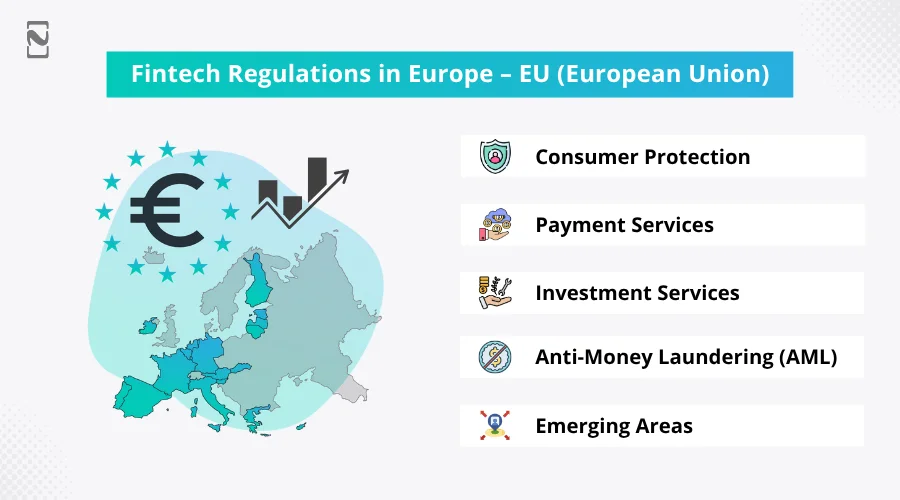
Let’s start with some of the generated ones, then we shall go with ones from each section.
Consumer Protection
- General Data Protection Regulation (GDPR): Requires strong data security and privacy measures, impacting data collection and usage practices across all fintech activities.
- Payment Account Directive (PAD): Ensures transparency and consumer protection for payment accounts, including basic bank accounts and e-wallets.
- Mortgage Credit Directive (MCD): Sets standards for fair mortgage lending practices, impacting fintechs offering mortgage-related services.
Payment Services
- Payment Services Directive 2 (PSD2): Enables open banking by mandating banks to open up access to customer data with their consent, facilitating innovative payment solutions.
- Electronic Money Directive (EMD): Regulates the issuance and distribution of electronic money, relevant for fintechs offering e-money products or services.
Investment Services
- Markets in Financial Instruments Directive II (MiFID II): Regulates investment firms and their activities, impacting fintechs offering investment advice, portfolio management, or securities trading.
- Prospectus Regulation: Sets requirements for prospectuses used to offer securities to the public, impacting crowdfunding platforms and investment token offerings.
Anti-Money Laundering (AML)
- AML Directive 5: Requires customer due diligence, transaction monitoring, and reporting of suspicious activity to prevent money laundering and terrorist financing, applicable to all financial institutions, including fintechs.
- Upcoming AML Package 6: Expands AML/CFT regulations, potentially introducing stricter requirements for crypto-assets and virtual asset service providers.
Emerging Areas
- Markets in Crypto-Assets Regulation (MiCA): Coming into effect in 2025, it will regulate crypto-asset issuances, trading platforms, and custodial wallets, providing clarity and harmonization for crypto-focused fintechs. It will also help provide a clear framework for how crypto taxes are handled, making things simpler for businesses and users involved in digital asset transactions.
- Digital Operational Resilience Act (DORA): Sets standards for digital resilience and incident response for financial institutions, impacting fintechs’ reliance on technology and their security practices.
Now that we are done with the fintech regulatory checklist for two of the most important fintech markets, it’s time to look at the specific regulations for fintech niches.
Regulations & Compliance for Different Fintech Businesses
Several fintech ideas branch into different niches or sectors. Each of them has different regulations and compliance for fintech.
Let’s look at them with a few examples.
| Sector | Prominent Regulations | Examples |
| eWallet Apps | PSD2 (Europe), Payment Services Directive (PSD) (various countries), AML/KYC requirements | Mobile wallet apps, P2P payments, and online money transfer |
| Loan Lending Apps | Consumer Financial Protection Bureau (US), Fair Lending Act (US), Dodd-Frank Act (US) | Peer-to-peer lending apps, online loan platforms, and alternative lending solutions |
| Investment Platforms | Securities and Exchange Commission (SEC) regulations (US), MiFID II (Europe), crowdfunding regulations | Robo-advisers, online investment platforms, and alternative investment platforms |
| InsurTech Apps | InsurTech regulations (varying by country) and AML/KYC requirements | InsurTech platforms offering parametric insurance and peer-to-peer insurance models |
| Wealth Management | Financial Industry Regulatory Authority (FINRA) regulations (US), Investment Advisers Act (US), GDPR (Europe) | Online wealth management platforms and digital asset advisors |
| Crowdfunding Platforms | Jumpstart Our Business Startups Act (JOBS Act) (US), crowdfunding regulations (varying by country) | Equity crowdfunding platforms, debt crowdfunding platforms, and reward-based crowdfunding platforms
|
The main point is to recognize that all regulations are designed to ensure fairness in the fintech industry.
Key Regulatory Drivers and Considerations
Explore the essential compliance factors that influence fintech innovation, from consumer protection laws to digital finance regulations.
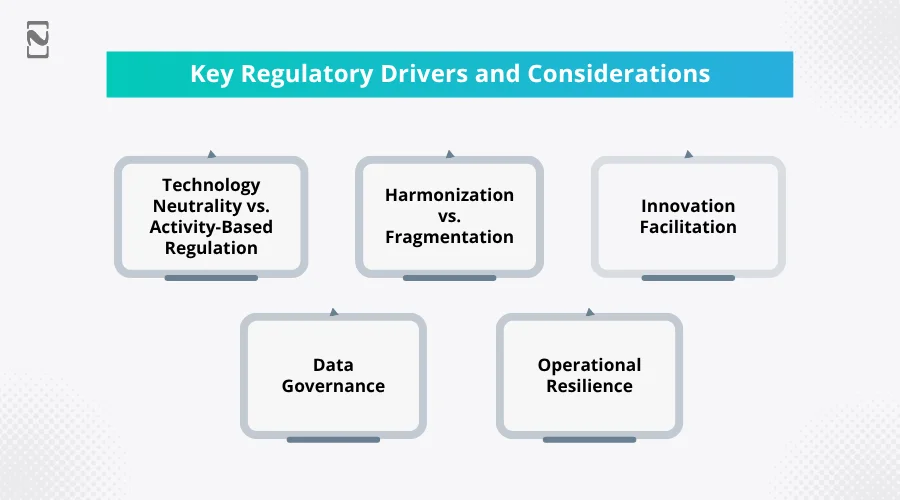
-
Technology Neutrality vs. Activity-Based Regulation
Regulators increasingly focus on the activity a fintech company performs (e.g., lending, payments, investment advice) rather than the technology used, but new technologies (like AI, DLT/blockchain) often require specific considerations.
-
Harmonization vs. Fragmentation
While regions like the EU strive for harmonization across member states, jurisdictions like the US maintain a more fragmented, multi-level regulatory approach.
-
Innovation Facilitation
Regulators are exploring “sandboxes,” innovation hubs, and specific charters to allow new products and services to be tested in a controlled environment.
-
Data Governance
The increasing use of data necessitates robust regulations around privacy, security, and ethical use of data.
-
Operational Resilience
As financial services become more digital, ensuring the stability and resilience of technology systems is paramount.
All in all, if you plan to launch a fintech solution or any type of financial service of your own. Then you have to build an infrastructure that meets all the compliance requirements. If you plan to start a fintech company, it should be built in a way that meets all the regulatory requirements.
How to Build a Fintech Solution that Adheres to all the Regulations & Compliance?
To have all these compliance requirements met, your solution should be designed and developed accordingly.
When your application collects data, it’s vital to ensure it is stored securely and used properly. Your solution must also comply with all relevant regulations regarding privacy and customer interactions. Being new in the industry, the majority of entrepreneurs are unaware of all the practices they have to comply with.
Hence, the ideal way to manage all the regulations and compliance is to hire a fintech app development company that has enough experience to guide you through.
At Nimble AppGenie, we often receive questions about our compliance and regulatory practices. We take pride in our highly stable solutions, designed to ensure easy regulatory compliance.
Our experience allows us to build precise fintech apps that support business growth while effectively managing compliance and regulations.
Connect with us today and we can help you easily with financial regulations and compliance!
Conclusion
Compliance with fintech regulations is crucial for both industry integrity and your business operations, as government bodies oversee this process. These regulations prevent malpractice, discourage the misuse of power for unfair advantages, and promote innovation that improves services for all.
Different compliance and regulatory requirements depend on the region in which your fintech application is built and offered.
Hence, you need to pay attention to how the application is developed. Hiring a team that understands compilation can help you achieve better results in no time.
I hope this information helps you understand the fintech regulations and compliance for 2025. That will be all for this post. Thanks for reading, good luck!
FAQs
Fintech regulations are rules and guidelines established by regulatory bodies to govern the activities of companies leveraging technology to provide financial services. These regulations aim to ensure consumer protection, maintain financial stability, and foster innovation within the fintech industry.
Fintech regulation is vital for a sustainable financial ecosystem, protecting consumers from fraud, ensuring financial stability, and promoting responsible innovation.
Fintech companies are regulated by various authorities based on their location and services. Key regulators include international organizations like the ISO and ITU, as well as national bodies such as the SEC in the U.S. and the FCA in the UK.
Fintech regulations include data privacy, AML, KYC protocols, and rules for lending, payments, and investment services.
Fintech regulations vary across regions due to differences in regulatory frameworks, legal requirements, and cultural considerations. For example, regulations in the European Union may differ from those in North America or Asia.
In the U.S., key fintech regulations include the Gramm-Leach-bliley Act (GLBA) for consumer privacy. The Fair Debt Collection Practices Act (FDCPA) for debt collection, and the SEC regulations for securities.
In the EU, important regulations include the GDPR for data protection and the Payment Services Directive 2 (PSD2) for payment services.
Fintech companies face challenges including regulatory complexity, high compliance costs, and competition with traditional financial institutions. The data privacy and security concerns, and the need for global regulatory harmonization.
Emerging trends in fintech regulation include:
- Consumer Protection: Safeguarding consumer rights in financial technology.
- Regulatory Convergence and Flexibility: Harmonizing and adapting regulations across jurisdictions.
- Open Banking and Data Sharing: Allowing consumers to share their financial data for improved competition.
- Addressing Regulatory Uncertainty: Managing the complexities of new technologies like decentralized finance (DeFi) and artificial intelligence (AI).
- Global Regulatory Collaboration: Enhancing cooperation among regulatory bodies worldwide.
These trends aim to support innovation while protecting consumers..

Niketan Sharma, CTO, Nimble AppGenie, is a tech enthusiast with more than a decade of experience in delivering high-value solutions that allow a brand to penetrate the market easily. With a strong hold on mobile app development, he is actively working to help businesses identify the potential of digital transformation by sharing insightful statistics, guides & blogs.
Table of Contents





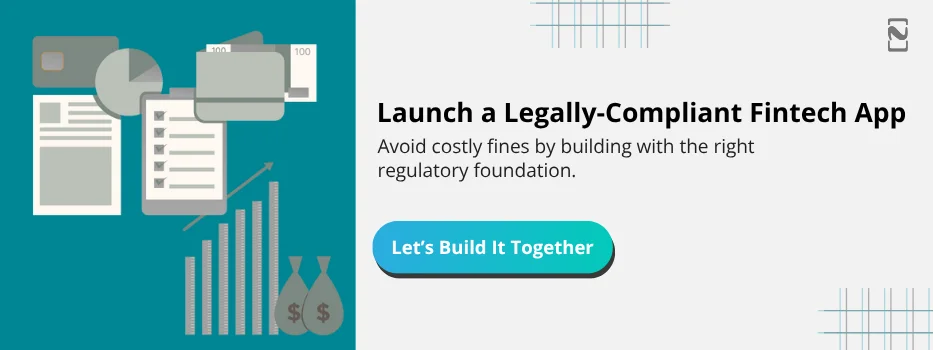

No Comments
Comments are closed.